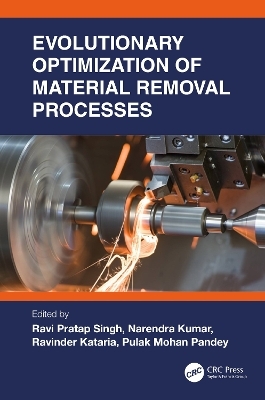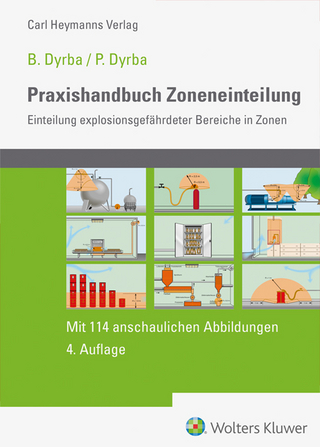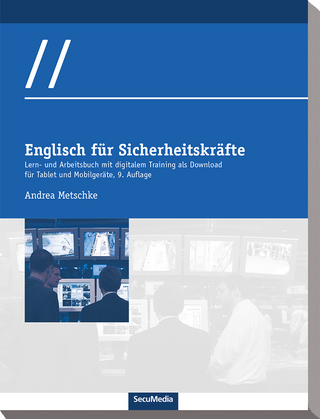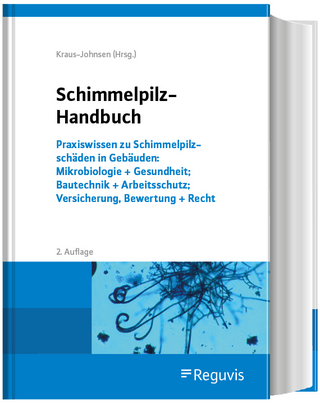
Evolutionary Optimization of Material Removal Processes
CRC Press (Verlag)
978-1-032-19270-3 (ISBN)
The text comprehensively focuses on the concepts, implementation, and application of evolutionary algorithms for predicting, modeling, and optimizing the various material removal processes from their origin to the current advancements. This one-of-a-kind book encapsulates all the features related to the application and implementation of evolutionary algorithms for the purpose of predicting and optimizing the process characteristics of different machining methods and their allied processes that will provide comprehensive information. It broadly explains the concepts of employing evolutionary algorithm-based optimization in a broad domain of various material removal processes. Therefore, this book will enable prospective readers to take full advantage of recent findings and advancements in the fields of traditional, advanced, micro, and hybrid machining, among others. Moreover, the simplicity of its writing will keep readers engaged throughout and make it easier for them to understand the advanced topics.
The book-
• Offers a step-by-step guide to implement evolutionary algorithms for the overall optimization of conventional and contemporary machining processes
• Provides in-depth analysis of various material removal processes through evolutionary optimization
• Details an overview of different evolutionary optimization techniques
• Explores advanced processing of various engineering materials-based case studies
It further discusses different nature-inspired algorithms-based modeling, prediction, and modeling of machining responses in attempting advanced machining of the latest materials and related engineering problems along with case studies and practical examples. It will be an ideal reference text for graduate students and academic researchers working in the fields of mechanical engineering, aerospace engineering, industrial engineering, manufacturing engineering, and materials science.
Dr Ravi Pratap Singh is presently working as an Assistant Professor in the Department of Industrial & Production Engineering at Dr. B. R. Ambedkar National Institute of Technology, Jalandhar, Punjab, India. Prior to this, he has also served the Department of Technical Education, Uttar Pradesh, India for about two years. He has received the Doctor of Philosophy (PhD) degree in the area of Rotary Ultrasonic Machining of Advanced Engineering Materials, and M.Tech. in Mechanical Engineering (Industrial and Production Engineering) from the Department of Mechanical Engineering, National Institute of Technology, Kurukshetra (Haryana), India. He is a Life Member of Indian Institution of Industrial Engineering (IIIE), Mumbai, India, and SCIence and Engineering Institute (SCIEI), Log Angeles, USA. Dr Singh is also a Senior Member of Indian Society of Mechanical Engineers (ISME), Chennai, India. He has published more than 100 research articles throughout the several SCI / Scopus indexed journal, including International / National level conferences. He is also academically engaged with the editorship and reviewership with the several SCI/ Scopus indexed Journals from last 9-10 years. He is also a Guest Editor of World Journal of Engineering (Emerald Publications), International Journal of Sustainable Materials and Structural Systems, and International Journal of Six Sigma and Competitive Advantage (Inderscience Publisher). Dr. Singh has organized several national/international conferences at NIT Jalandhar as a convener/organizing secretary/session coordinator, etc. Besides research excellence, He has awarded as Young Scientist in Mechanical Engineering in VIRA-2019 awards, as Young Faculty in Engineering (Major Area: Mechanical Engineering) in VIFA-2019 awards, and as Best Researcher Award in 4th International Scientist Awards on Engineering, Science, and Medicine during January, 2020 in New Delhi, India. He has delivered several Expert Talks/Lectures at different level of platform throughout the country. He has also been nominated as General Chair Reviewer, Technical Program Committee, National Advisory Committee, etc. during various national/international events held at China, Norway, and India. In addition to this, he is also serving as an Ambassador of Bentham Open, Sharjah, UAE as well as a Member of Visor Academic Committee, Singapore. Dr. Singh has also been ranked among top 2% Scientists in the world as per the survey conducted by STANFORD University for the year 2021. Dr. Narendra Kumar is Assistant Professor in the Industrial and Production Engineering Department at Dr. BR Ambedkar National Institute of Technology, Jalandhar, Punjab. He obtained his Ph.D in Mechanical Engineering from Indian Institute of Information Technology, Design and Manufacturing Jabalpur. His research work was based on Development and Performance Evaluation of Pellet based Additive Manufacturing Process for Flexible Parts. His thesis project was the part of DST sponsored project "Hybrid Additive-Subtractive Manufacturing System using CNC Machining Center". Prior to joining, NIT Jalandhar, he has worked for Bajaj Institute of Technology, Wardha. He also worked on DST/AMT sponsored project titled "development of metal-based deposition system using induction heating method" as Research Associate. His research interests are broadly related to Additive Manufacturing, Machining Methods and Material Development. He has published more than 18 research papers in international journals and conferences proceedings of high repute. Dr Ravinder Kataria is presently working as an Associate Professor in the School of Mechanical Engineering at Lovely Professional University, Jalandhar, Punjab, India. He has received the Doctor of Philosophy (PhD) degree in the area of Ultrasonic Machining of Advanced Engineering Materials, and M.Tech. in Mechanical Engineering (Industrial and Production Engineering) from the Department of Mechanical Engineering, National Institute of Technology, Kurukshetra (Haryana), India. He is a Life Member of SCIence and Engineering Institute (SCIEI), Log Angeles, USA. He has published more than 45 research articles throughout the several SCI / Scopus indexed journal, including National / International level conferences. His broad areas of research are as follows; Conventional & Advanced Manufacturing Processes, Advanced Engineering Materials, Micro-structure Analysis. He is also an Associate Editor of World Journal of Engineering (Emerald Publications). Prof. Pulak Mohan Pandey completed his B.Tech. degree from H.B.T.I. Kanpur in 1993 securing first position and got Master’s degree from IIT Kanpur in 1995 in Manufacturing Science specialization. He served H.B.T.I. Kanpur as faculty member for approximately 8 years and also completed Ph.D. in the area of Additive Manufacturing/3D Printing from IIT Kanpur in 2003. He joined IIT Delhi as a faculty member in 2004 and is presently serving as Professor. In IIT Delhi, Dr Pandey diversified his research areas in the field of micro and nano finishing, micro-deposition and also continued working in the area of 3D Printing. He supervised 32 PhDs and more than 36 MTech theses in last 10 years and also filed 21 Indian patent applications. He has approximately 185 international journal papers and 45 international/national refereed conference papers to his credit. These papers have been cited for more than 6032 times with h-index as 38. He received Highly Commended Paper Award by Rapid Prototyping Journal for the paper “Fabrication of three dimensional open porous regular structure of PA 2200 for enhanced strnegth of scaffold using selective laser sintering” published in 2017. Many of his B.Tech. and M.Tech. supervised projects have been awarded by IIT Delhi. He is recipient of Outstanding Young Faculty Fellowship (IIT Delhi) sponsored by Kusuma Trust, Gibraltar and J.M. Mahajan outstanding teacher award of IIT Delhi. His students have won GYTI (Gandhian Young Technological Innovation Award) in 2013, 2015, 2017, 2018 and 2020.
Chapter 1
Experimental Investigation of Surface Roughness for Turning of UD-GFRP Composite Using PSO, GSA and PSOGSA Technique
Meenu and Surinder Kumar
Chapter 2
Multi-response Optimization During High-speed Drilling of Composite Laminate Using Grey Entropy Fuzzy (GEF) and Entropy Based Weight Integrated Multi-Variate Loss Function
Jalumedi Babu, Khaleel Ahmed, Lijo Paul, Abyson Scaria, and J. Paulo Davim
Chapter 3
Implementation of modern meta-heuristic algorithms for optimizing machinability in dry CNC finish-turning of AISI H13 die steel under annealed and hardened states
Nikolaos A. Fountas, Ioannis Papantoniou, John Kechagias, Dimitrios E. Manolakos, and Nikolaos M. Vaxevanidis
Chapter 4
Multi-response Optimization in Turning of UD-GFRP Composites using Weighted Principal Component Analysis (WPCA)
Meenu and Surinder Kumar
Chapter 5
Processes parameters optimization on surface roughness in turning of E-glass UD-GFRP composites using Flower Pollination Algorithm (FPA)
Surinder Kumar and Meenu
Chapter 6
Application of ANN and Taguchi technique for material removal rate by Abrasive Jet Machining with special abrasive materials
Sachin P. Ambade, Chetan K. Tembhurkar, Sagar Shelare and Santosh Gupta
Chapter 7
Investigation of MRR in face turning unidirectional GFRP composites by using Multiple Regression Methodology and Artificial Neural Network
Surinder Kumar, Meenu, and Pawan Kumar
Chapter 8
Optimization of CNC Milling Parameters for Al-CNT composites using Entropy based Neutrosophic Grey Relational TOPSIS Method
Sachchida Nand, Manvandra K Singh, and C M Krishna
Chapter 9
Experimental investigation of EDM potential to machine AISI 202 using Copper-alloy electrode and its modelling by Artificial Neural Network
Subhash Singh, and Girija Nandan Arka
Chapter 10
Prediction and Neural Modelling of Material Removal Rate in Electrochemical Machining of Nimonic 263 Alloy
Dilkush Bairwa, Dr Ravi Pratap Singh, Dr Ravinder Kataria, Dr Ravi Butola, Dr Mohd Javaid, Shailendra Chauhan, Madhusudan Painuly
Chapter 11
Optimization of End Milling Process Variables Using Multi Objective Genetic Algorithm
Jignesh Girishbhai Parmar, and Dr. Komal Ghanshyambhai Dave
Chapter 12
Micro-Electrochemical Machining of Nimonic 263 Alloy: An Experimental Investigation and ANN-based Prediction of Radial Over Cut
Dilkush Bairwa, Dr Ravi Pratap Singh, Dr Ravinder Kataria, Dr Sandeep Singhal, Dr Narendra Kumar, Shailendra Chauhan, and Madhusudan Painuly
| Erscheinungsdatum | 10.01.2023 |
|---|---|
| Zusatzinfo | 88 Tables, black and white; 45 Line drawings, black and white; 70 Halftones, black and white; 106 Illustrations, color; 9 Illustrations, black and white |
| Verlagsort | London |
| Sprache | englisch |
| Maße | 156 x 234 mm |
| Gewicht | 462 g |
| Themenwelt | Technik |
| ISBN-10 | 1-032-19270-4 / 1032192704 |
| ISBN-13 | 978-1-032-19270-3 / 9781032192703 |
| Zustand | Neuware |
| Haben Sie eine Frage zum Produkt? |
aus dem Bereich


